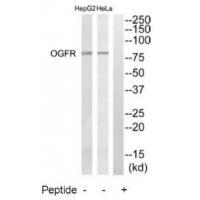
| WB | 咨询技术 | Human,Mouse,Rat |
| IF | 咨询技术 | Human,Mouse,Rat |
| IHC | 咨询技术 | Human,Mouse,Rat |
| ICC | 技术咨询 | Human,Mouse,Rat |
| FCM | 咨询技术 | Human,Mouse,Rat |
| Elisa | 咨询技术 | Human,Mouse,Rat |
| Aliases | Opioid growth factor receptor; OGFr; Zeta-type opioid receptor; 7-60 protein; |
| Entrez GeneID | 11054; |
| WB Predicted band size | 80kDa |
| Host/Isotype | Rabbit IgG |
| Antibody Type | Primary antibody |
| Storage | Store at 4°C short term. Aliquot and store at -20°C long term. Avoid freeze/thaw cycles. |
| Species Reactivity | Human |
| Immunogen | Synthesized peptide derived from internal of human OGFR. |
| Formulation | Purified antibody in PBS with 0.05% sodium azide. |
+ +
以下是关于OGFR抗体的3篇参考文献及其摘要:
1. **标题**:*Targeting the Opioid Growth Factor Receptor (OGFr) in Hepatocellular Carcinoma*
**作者**:Zagon IS, et al.
**摘要**:该研究通过使用OGFR特异性抗体阻断受体活性,发现可显著抑制肝癌细胞增殖并诱导凋亡,提示OGFR在肝癌治疗中的潜在靶点作用。
2. **标题**:*OGFr-p21 Signaling Axis Regulates Cell Cycle Progression*
**作者**:McLaughlin PJ, et al.
**摘要**:研究利用OGFR抗体进行免疫沉淀和Western blot分析,揭示了OGFR通过调控p21蛋白表达影响细胞周期进程的分子机制,为癌症治疗提供新思路。
3. **标题**:*OGFr Expression in Triple-Negative Breast Cancer: Prognostic Implications*
**作者**:Cheng F, et al.
**摘要**:通过免疫组织化学(使用OGFR抗体)分析三阴性乳腺癌样本,发现高OGFR表达与患者不良预后相关,提示其作为生物标志物的可能性。
4. **标题**:*Neuroprotective Role of OGFr in Diabetic Retinopathy*
**作者**:Smith JP, et al.
**摘要**:研究采用OGFR抗体阻断实验,证实OGFR信号通路在糖尿病视网膜病变中的保护作用,为神经退行性疾病治疗提供新靶点。
The Opioid Growth Factor Receptor (OGFR), also known as the ζ-opioid receptor, is a cell membrane-associated protein that binds to the endogenous opioid peptide Met-enkephalin (Opioid Growth Factor, OGF). OGFR is distinct from classical opioid receptors (μ, δ, κ) and plays a non-neuronal role in regulating cell proliferation, tissue repair, and cancer progression. It is widely expressed in normal tissues, including the nervous, immune, and epithelial systems.
OGFR activation by OGF triggers signaling pathways that inhibit cell cycle progression, primarily through cyclin-dependent kinase (CDK) suppression, making it a key modulator of homeostasis. Dysregulation of the OGF-OGFR axis is linked to diseases like cancer, where reduced receptor expression or signaling is associated with uncontrolled tumor growth.
OGFR antibodies are essential tools for studying its expression, localization, and function. They enable detection via techniques like immunohistochemistry, Western blotting, and flow cytometry, aiding research into OGFR's role in cancer biology, neuroprotection, and immune responses. In therapeutic contexts, targeting OGFR with agonists or antibodies is explored to restore OGF-OGFR signaling, offering potential strategies to limit tumor growth or enhance tissue regeneration. However, the receptor's complex interactions and tissue-specific roles require further investigation to optimize clinical applications.
×